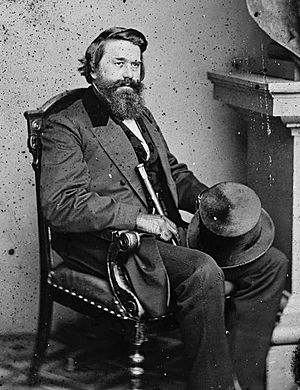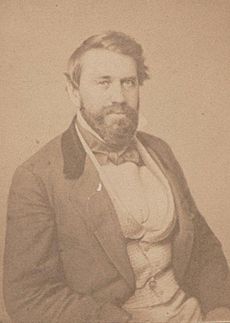Louis Wigfall facts for kids
Quick facts for kids
Louis Wigfall
|
|
|---|---|
 |
|
| Confederate States Senator from Texas |
|
| In office February 18, 1862 – May 10, 1865 |
|
| Preceded by | Constituency established |
| Succeeded by | Constituency abolished |
| Member of the Provisional Congress of the Confederate States from Texas |
|
| In office February 4, 1861 – February 17, 1862 |
|
| Preceded by | Constituency established |
| Succeeded by | Constituency abolished |
| United States Senator from Texas |
|
| In office December 5, 1859 – March 23, 1861 |
|
| Preceded by | Matthias Ward |
| Succeeded by | James Flanagan (1870) |
| Member of the Texas Senate from the 8th district |
|
| In office November 7, 1857 – December 7, 1859 |
|
| Preceded by | William Scott |
| Succeeded by | E. A. Blanch |
| Personal details | |
| Born |
Louis Trezevant Wigfall
April 21, 1816 Edgefield, South Carolina, U.S. |
| Died | February 18, 1874 (aged 57) Galveston, Texas, U.S. |
| Political party | Democratic |
| Spouse |
Charlotte Cross
(m. 1841) |
| Education | University of Virginia University of South Carolina (BA) |
| Military service | |
| Allegiance | |
| Branch/service | |
| Years of service | 1861–1862 |
| Rank | Brigadier General |
| Battles/wars | American Civil War |
Louis Trezevant Wigfall (born April 21, 1816 – died February 18, 1874) was an American politician. He served as a Confederate States Senator for Texas from 1862 to 1865. Wigfall was part of a group called "Fire-Eaters," who strongly supported states' rights and the expansion of a society that relied on slave labor. He briefly served as a Confederate Brigadier General in the Texas Brigade at the start of the American Civil War. After this, he became a senator. Wigfall was known for his powerful speeches and strong personality. He was also a slave owner.
Contents
Early Life and Political Beginnings
Growing Up in South Carolina
Louis Wigfall was born on a plantation near Edgefield, South Carolina. His father passed away when Louis was young, and his mother died when he was 13. He had an older brother who was killed in a duel. Another brother became a bishop.
Louis was tutored until 1834. He then attended a military school for a year. In 1836, he went to South Carolina College (now the University of South Carolina). He studied law and was interested in student rights. He also spent time fighting in the Second Seminole War in Florida, where he became a Lieutenant. He graduated in 1837.
Moving to Texas
In 1848, Wigfall moved to Texas. He joined a law practice in Nacogdoches, Texas, and later settled in Marshall, Texas. He quickly became involved in politics. He served in the Texas House of Representatives from 1849 to 1850. Later, he was in the Texas Senate from 1857 to 1860.
He became a strong political opponent of Sam Houston, a famous Texas leader. Wigfall often followed Houston on his campaign stops, criticizing his actions and accusing him of not supporting the South.
Serving in the U.S. Senate
In 1859, the Texas legislature chose Wigfall to be a United States Senator. He served in the U.S. Senate until March 1861. During this time, Texas decided to leave the United States. Wigfall continued to speak in the Senate, arguing for the Southern states' right to secede.
He was expelled from the U.S. Senate in July 1861 because he supported the Southern rebellion. After leaving Washington D.C., he went to Baltimore, Maryland, to recruit soldiers for the new Confederacy. Then he traveled to Richmond, Virginia, which became the Confederate capital.
Role in the American Civil War
Before the war officially started, Wigfall pushed for attacks on U.S. forts like Fort Sumter. He believed this would encourage other Southern states to join the Confederacy. In January 1865, Wigfall explained his reasons for supporting the Confederacy. He stated his opposition to African American equality.
During the attack on Fort Sumter, Wigfall was an aide to General P. G. T. Beauregard. Without permission, he rowed to the fort and demanded its surrender from Major Robert Anderson. This event made him famous. However, Wigfall had offered terms of surrender that General Beauregard had already refused.
Leading a Brigade
Because of his fame, Wigfall was quickly promoted to colonel of the 1st Texas Infantry Regiment. Soon after, he became a brigadier general of the "Texas Brigade" in the Confederate Army. He resigned his military position in February 1862 to become a Confederate Senator. John Bell Hood took his place as commander.
Confederate States Senator
At the beginning of the war, Wigfall was a close friend of Confederate President Jefferson Davis. However, their friendship changed as the war continued. Davis wanted a stronger national government, but Wigfall believed strongly in states' rights. He tried to stop the creation of a Confederate Supreme Court, fearing it would rule against the states.
Wigfall also disagreed with Davis on many military decisions. He was a close friend of Confederate General Joseph E. Johnston and often proposed laws to help him. Wigfall was also one of the first to suggest that Robert E. Lee should command all Confederate armies.
Later Life
After the war ended, Wigfall returned to Texas. He then went to London in 1866 as an exile. He tried to cause problems between Britain and the United States. He bought a mine in Colorado and came back to the U.S. in 1870. He lived in Baltimore, Maryland, for a while. In January 1874, he was in Galveston, Texas. He died there a month later and is buried in the Episcopal cemetery.
In Popular Culture
- In the 1992 novel The Guns of the South by Harry Turtledove, Senator Wigfall appears as a character. The book uses real quotes from Wigfall.
- In the historical novel The Lincoln Special by Peg A. Lamphier, Wigfall is a main character.
See also
- List of American Civil War generals (Confederate)
- List of United States senators expelled or censured
- List of United States senators from Texas
 | Jewel Prestage |
 | Ella Baker |
 | Fannie Lou Hamer |


